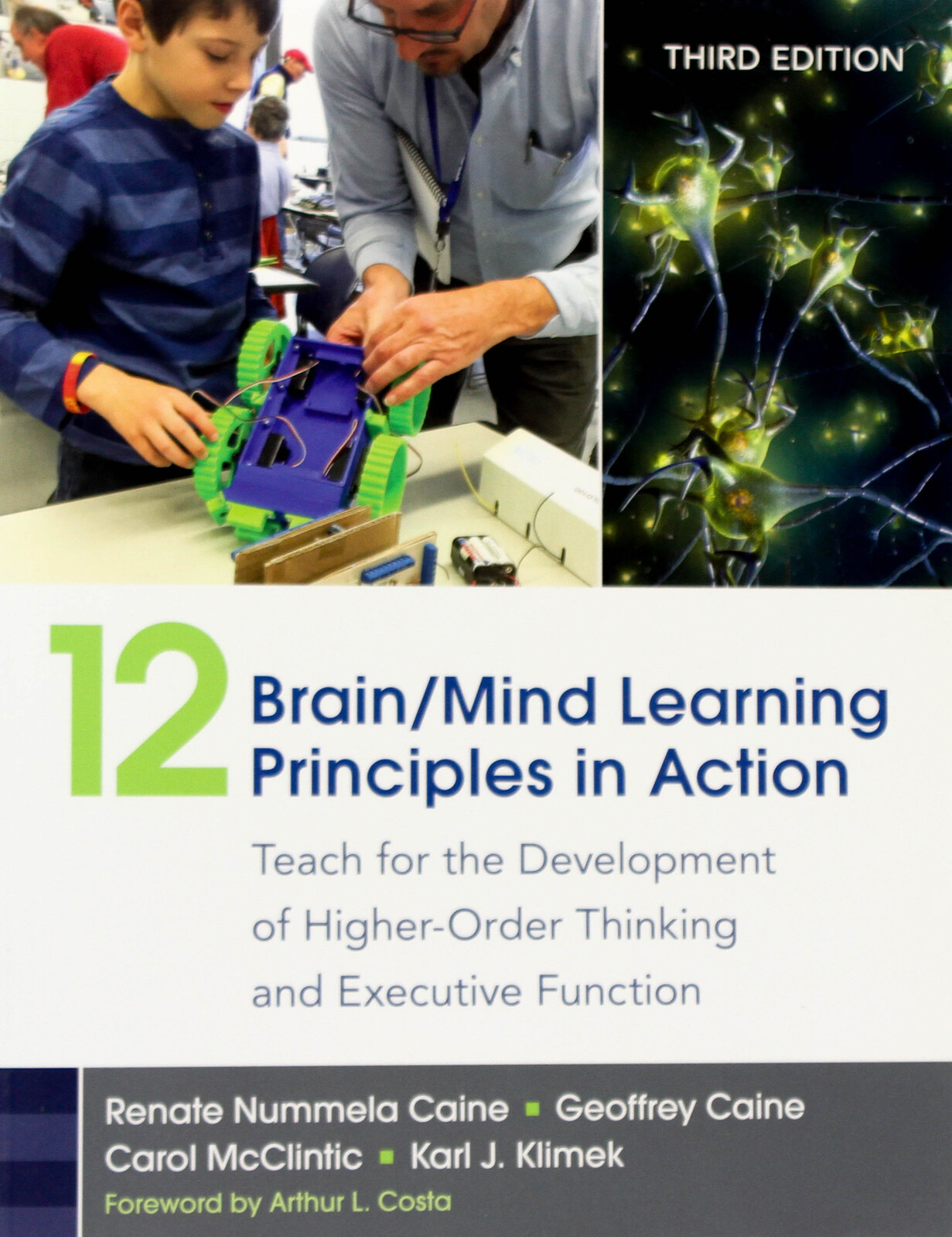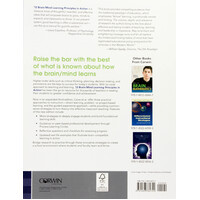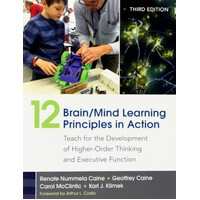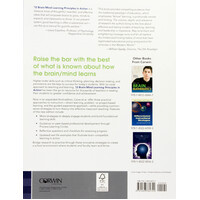12 Brain/Mind Learning Principles in Action Paperback Novel Novel Book
Teach for the Development of Higher-Order Thinking and E
12 Brain/Mind Learning Principles in Action: Teach for the Development of Higher-Order Thinking and Executive Function
Author: Caine, Renate Nummela,Caine, Geoffrey,Carol Lynn McClintic,Karl J. KlimekPublisher: SAGE Publications IncCategory: Educational Psychology, Educational Psychology, Teacher Training, Teacher Training, Teaching Skills & Techniques, Teaching Skills & TechniquesBook Format: PaperbackHigher-order skills such as critical thinking, planning, decision-making and persistence are the key to success for today's students. With its novel approach to teaching and learning, 12 Brain/Mind Learning Principles in Action has been the go-to resource for thousands of teachers in leading their students to greater confidence and achievement. Now in an expanded third edition, Caine et al. offer three practical approaches to instruction-direct, problem or project-based learning, and the guided experience approach-while providing common-sense strategies to turn theory into effective classroom teaching. Features of the new edition include
- More strategies to deeply engage students and build foundational learning skills
- Guidance on peer-based professional development through Process Learning Circles
- Reflective questions and checklists for assessing progress
- Updated, real-life examples that illustrate brain-compatible learning in action
Bridge research to practice through these innovative strategies to create a school environment where students and faculty learn and thrive.
Renate Nummela Caine is a principal of Caine Learning LLC and consultant to districts, schools, teachers, administrators, and communities to implement brain-based learning. She is the senior author, with Geoffrey Caine, of the groundbreaking Making Connections: Teaching and the Human Brain. She has worked with countless educators in the U.S. and around the globe. Recently, Renate and Geoffrey Caine worked with a low-income, underachieving K-5 elementary school in California to help teachers design more innovative teaching strategies using the brain/mind learning principles and district standards. Caine is professor emeritus of education at California State University in San Bernardino, where she was also executive director of the Center for Research in Integrative Learning and Teaching. She has taught every level from kindergarten to university. She earned her PhD from the University of Florida in educational psychology.
Foreword to the Third Edition
Preface
Acknowledgments
About the Authors
1. Getting Started
PART I: The First Foundational Element--Relaxed Alertness
2. Why Relaxed Alertness Provides the Optimum Emotional Climate for Learning
3. Brain/Mind Learning Principle-Complex Learning Is Enhanced by Challenge and Inhibited by Threat, Helplessness, and Fatigue
4. Brain/Mind Learning Principle--The Brain/Mind Is Social
5. Brain/Mind Learning Principle--The Search for Meaning Is Innate
6. Brain/Mind Learning Principle--Emotions Are Critical to Patterning
PART II: The Second Foundational Element--Orchestrated Immersion in Complex Experience
7. Creating the Richest Learning Environments Using Orchestrated Immersion in Complex Experience
8. Brain/Mind Learning Principle--The Brain/Mind Processes Parts and Wholes Simultaneously
9. Brain/Mind Learning Principle--All Learning Engages the Physiology
10. Brain/Mind Learning Principle--The Search for Meaning Occurs Through Patterning
11. Brain/Mind Learning Principle--Learning Is Developmental
PART III: The Third Foundational Element--Active Processing of Experience
12. Helping Learners Digest and Consolidate Learning
13. Brain/Mind Learning Principle--Each Brain Is Uniquely Organized
14. Brain/Mind Learning Principle--There Are at Least Two Ways to Approach Memory
15. Brain/Mind Learning Principle--Learning Engages Both Focused Attention and Peripheral Perception
16. Brain/Mind Learning Principle--Learning Is Both Conscious and Unconscious
17. Teaching with Body/Mind Interconnectedness in Mind
Resource A: The Brain/Mind Capacities Wheel
Resource B: The Brain/Mind Principles Wheel
Resource C: How to Develop Process Learning Circles
Resource D: Guided Experiences Cycle
Resource E: Guidelines for the Guided Experiences Model
Resource F: Global Experiences Design Wheel
Resource G: Sensory Poem
References
Index
Table Of Contents
Foreword to the Third Edition Preface Acknowledgments About the Authors 1. Getting Started PART I: The First Foundational Element--Relaxed Alertness 2. Why Relaxed Alertness Provides the Optimum Emotional Climate for Learning 3. Brain/Mind Learning Principle-Complex Learning Is Enhanced by Challenge and Inhibited by Threat, Helplessness, and Fatigue 4. Brain/Mind Learning Principle--The Brain/Mind Is Social 5. Brain/Mind Learning Principle--The Search for Meaning Is Innate 6. Brain/Mind Learning Principle--Emotions Are Critical to Patterning PART II: The Second Foundational Element--Orchestrated Immersion in Complex Experience 7. Creating the Richest Learning Environments Using Orchestrated Immersion in Complex Experience 8. Brain/Mind Learning Principle--The Brain/Mind Processes Parts and Wholes Simultaneously 9. Brain/Mind Learning Principle--All Learning Engages the Physiology 10. Brain/Mind Learning Principle--The Search for Meaning Occurs Through Patterning 11. Brain/Mind Learning Principle--Learning Is Developmental PART III: The Third Foundational Element--Active Processing of Experience 12. Helping Learners Digest and Consolidate Learning 13. Brain/Mind Learning Principle--Each Brain Is Uniquely Organized 14. Brain/Mind Learning Principle--There Are at Least Two Ways to Approach Memory 15. Brain/Mind Learning Principle--Learning Engages Both Focused Attention and Peripheral Perception 16. Brain/Mind Learning Principle--Learning Is Both Conscious and Unconscious 17. Teaching with Body/Mind Interconnectedness in Mind Resource A: The Brain/Mind Capacities Wheel Resource B: The Brain/Mind Principles Wheel Resource C: How to Develop Process Learning Circles Resource D: Guided Experiences Cycle Resource E: Guidelines for the Guided Experiences Model Resource F: Global Experiences Design Wheel Resource G: Sensory Poem References IndexAbout Renate Nummela Caine
Renate Nummela Caine is a principal of Caine Learning LLC and consultant to districts, schools, teachers, administrators, and communities to implement brain-based learning. She is the senior author, with Geoffrey Caine, of the groundbreaking Making Connections: Teaching and the Human Brain. She has worked with countless educators in the U.S. and around the globe. Recently, Renate and Geoffrey Caine worked with a low-income, underachieving K-5 elementary school in California to help teachers design more innovative teaching strategies using the brain/mind learning principles and district standards. Caine is professor emeritus of education at California State University in San Bernardino, where she was also executive director of the Center for Research in Integrative Learning and Teaching. She has taught every level from kindergarten to university. She earned her PhD from the University of Florida in educational psychology. Geoffrey Caine, a director of Caine Learning LLC, is a learning consultant and process coach. Caine has been published extensively and is co-author of six books, including Making Connections: Teaching and the Human Brain. His work carries him throughout the United States and abroad. He works in the worlds of education, business, and government, where he capitalizes on his prior experiences as a professor of law, an education services manager of a national software company, a state manager of a national publishing company, and national director of the Mind/Brain Network of the American Society for Training and Development. He has given keynote addresses or made presentations to the Campaign for Learning in the United Kingdom, the World Conference on Education for All, the Eighth International Conference on Thinking, the Whole Schools Institute sponsored by the Mississippi Arts Commission, and numerous other national and regional organizations and associations. Caine's major interest is in how best to improve the ways in which people learn together. He directs his attention to the arts of deep listening, dwelling in the question, and processing experience for the lessons it has to offer. Carol Lynn McClintic is an educational leader with diverse experience as a teacher at numerous levels, including preschool, elementary, middle, high, and university. She is a master teacher (over eighteen student teachers, plus BITSA and peer coach), a mentor teacher, and a model teacher. She has led and co-led many workshops for her district, taught numerous education extension classes for teachers at local universities-including co-creating a certificate program for conflict resolution-been a coordinator for university and district grant programs, and consulted with Caine Learning since 1995, participating in workshops throughout the United States. McClintic has co-authored the book Wouldn't It Be Wonderful: A Guide to Teaching in the Twenty-first Century and co-written an article with Geoffrey and Renate Nummela Caine. She has received several awards and retired from active teaching in 2002 after thirty-five years. Karl Klimek is the Executive Orchestrator of the Square One Education Network, a nonprofit organization that incorporates brain/mind learning theory and practices in schools, with special focus on science, technology, engineering, and mathematics projects (www.squareonenetwork.org). He is lead author of Generative Leadership: Shaping New Futures for Today's Schools (2008, Corwin Press), co-author of 12 Brain-Mind Learning Principles in Action: Developing Executive Functions of the Human Brain (2004 / 2008, Corwin Press) and has taught in Washington, Wyoming, and Michigan at both the public school and university levels. His school administrative experience includes service as a principal and as assistant superintendent for curriculum and instruction in a suburban Detroit, Michigan district. Karl is President of 2 Perspectives: Learning Through Leadership (www.2perspectives.us.com) and has worked extensively in career and technology education developing state and federal programs. He is a Senior Associate of the Caine Learning Institute, Idyllwild, CA and is Board Vice President of the Natural Learning Research Institute. Karl received his undergraduate degree in education from Central Washington University and his master's in educational leadership from Eastern Michigan University. He is recognized for his practical and enthusiastic presentations as a speaker and project development/design facilitator.| SKU | BK-9781483382722 |
| Barcode # | 9781483382722 |
| Brand | SAGE Publications Inc |
| Artist / Author | Caine, Renate Nummela, Caine, Geoffrey, Carol Lynn McClintic, Karl J. Klimek |
| Shipping Weight | 0.9000kg |
| Shipping Width | 0.220m |
| Shipping Height | 0.020m |
| Shipping Length | 0.280m |
| Assembled Length | 27.700m |
| Assembled Height | 2.300m |
| Assembled Width | 21.600m |
| Type | Paperback |






